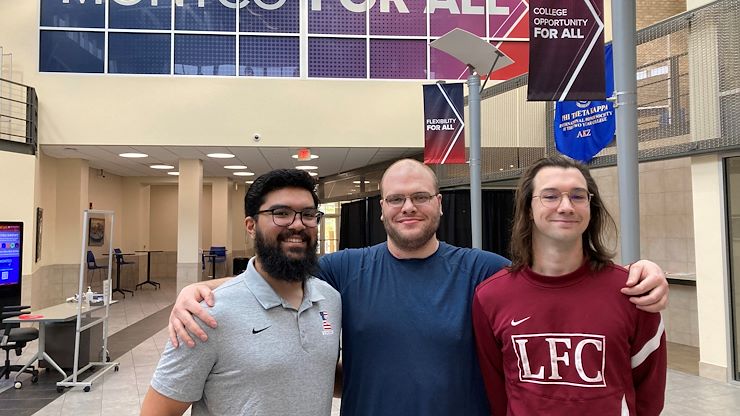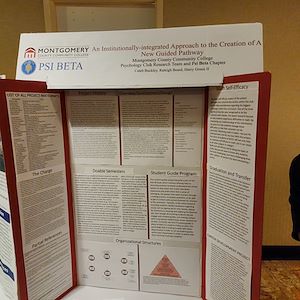
Psychology students Raleigh Beard, Caleb Buckley and Harry Green presented a poster at the Middle States Commission on Higher Education conference recently. Photo by Eric Devlin.
Three Montgomery County Community students had the privilege of presenting a poster to the Middle States Commission on Higher Education (MSCHE) during its annual conference recently.
Psychology students Raleigh Beard, Caleb Buckley and Harry Green showcased the administratively supported guided student pathway research “An Institutionally-integrated Approach to the Creation of a New Guided Pathway,” during the conference in Philadelphia, Dec. 8. MCCC was one of 32 colleges and universities nationwide to attend the conference and only one of four community colleges in attendance. It was the first time the conference hosted students.
Buckley, 26, of Pennsburg, is president of MCCC’s Psychology Club, Beard, 30, of Pottstown, is the club’s vice president, and Green, 23, of Harleysville, is the education coordinator. The three are also members of MCCC’s chapter of Psi Beta, the Community College National Honor Society in Psychology.
 The poster featured multiple components of the guided student pathway project, which
is a collaborative effort between the students, full and part-time Psychology faculty
and the administration.
The poster featured multiple components of the guided student pathway project, which
is a collaborative effort between the students, full and part-time Psychology faculty
and the administration.
“It dealt with the stages of student pathways coming from high school to Montco,” said Beard, “and then transferring out of Montco to a four-year institution or into a career.”
The poster was organized into four main categories: 1. The creation of a recommended roadmap for new Psychology students searching how best to navigate the program and beyond, 2. “Doable” semesters, or a review of which courses fit well together to help prevent students from feeling they’ve taken on a larger workload than then can handle in one semester, 3. Math self-efficacy, or building self confidence in math courses, and 4. Career retention, or what can be done to increase student retention.
“On top of that, we had a transfer study,” said Buckley. “When students graduate and go on to a career or transfer to a four-year institution, how do we make that a fluid pathway?”
“With career development, there’s so much information on all options,” said Green. “You don’t have to do the workload yourself. If you can understand the end goal, it makes the pathways easier.”
The project seeks to advance the national initiative to create new models to help support student's efforts to move from high school to college and beyond.
“Knowing where to go helps with motivation, it helps with hard classes,” said Beard. “I know what I want to do for a career. It helped me get through hard classes.”
“You don’t have to do the workload yourself. If you can understand the end goal, it makes the pathways easier.” —Psychology student Harry Green
The opportunity to attend the conference presented itself after Psychology Professor Dr. Steven Baron and Psychology Lecturer Michael Baron, the co-advisors of the Psychology Club and Psi Beta, approached the three students about the possibility of submitting the poster for the MSCHE conference committee to review.
“Dr. Baron said it looked like we met four out of the seven criteria to present, and you only needed to meet one,” said Buckley. “Our specific study was pretty new, and we felt it was important to get it out into the public eye.”
For the three students, the conference was a great opportunity to network, meet new people and exchange ideas.
“The conference went really well,” said Green. “At one point we were finishing lunch and Dr. Davie Jane Gilmour, President of Pennsylvania College of Technology, and chair of the MSCHE commission, stopped by to say hello. We didn’t know who she was. She was really nice. She engaged with our poster and brought one of her colleagues over to view it too.”
“She was extremely encouraging,” said Buckley, “and excited to support students.”
“She said, ‘You have a bright career ahead of you,’” said Beard.
Dr. Baron agreed.
“This will significantly help the students with both educational and career pursuits,” he said. “This can be substantiated by those members of the Psychology Club and Psi Beta, who came before them.”
Green graduated from MCCC following the fall 2022 semester and transferred to Temple University, a four-year partner school, to continue to pursue a bachelor’s degree in Psychology and become a researcher. Raleigh, who began studying in the spring of 2020 at MCCC, plans to pursue a PhD. in Psychology to research childhood abuse. Buckley just completed his associate’s degree program in Psychology at MCCC in December 2022 and is now looking to transfer to a four-year institution this fall.
Beard, Buckley and Green thanked the students, faculty and alumni in the Psychology Club who participated and helped with the project.
“It wouldn’t have been possible without their help,” said Buckley.
